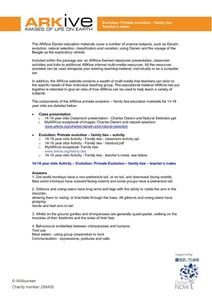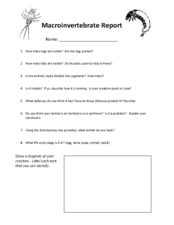Curated OER
Name that plant!
What is a dichotomous key? When your kids ask, hand them a learning exercise like this one, to explain it. They use the key to identify four different trees, based on the budding twigs they've produced. Tip: Have learners extend this...
Curated OER
Name that metal!
Learners have to have had some experience with metals prior to using this worksheet. They are given five properties common to five different metals. They create or use a dichotomous key to identify the five mystery metals. Tip: This...
Curated OER
Distinguishing Between Flowers
A branching key is a great way to classify different types of animals and plants! Fifth graders answer several yes/no answers about three different plants. They then create their own key to differentiate between an iris, a rose, and a...
South Gloucestershire Council
Animal Classification: A Collaborative Sorting Activity for Key Stages 2 & 3
Introduce the logic behind a dichotomous key or administer a group performance assessment with a fun and challenging classification lesson. With explicit instructions for the teacher and for collaborative groups, as well as engaging...
Curated OER
Student Dichotomous Key for Insects
In this student dichotomous key worksheet, students work in groups to create genus and species names for a list of insects assigned to them. Students then create a key for the new names given to their assigned list of insects.
Curated OER
Primary Activity: Dichotomous Key of Energy Sources
In this energy sources worksheet, students fill in a chart using a dichotomous key of energy sources. They use follow the directions and label items such as the sun, a windmill, and an oil rig with the proper number and letter labels...
Curated OER
Dichotomous Key
For this species worksheet, students use a dichotomous key to identify the 8 different species of "Norns," a fictitious animal group.
Curated OER
Taxonomy, Classification, and Dichotomous Keys
For this taxonomy worksheet, students use a dichotomous key for creatures found on planet Pamishan to identify each individual creature. This worksheet has 20 creatures to identify.
Curated OER
Regents High School Examination: Living Environment 2010
This exam touches upon every topic within the typical first year biology course.. A broad variety of question styles give high schoolers every opportunity to show what they know. Why start from scratch when a comprehensive final exam is...
Curated OER
Mystery Minerals
In this science activity, students complete a chart of mineral properties. Minerals are listed by number, and students perform various tests to determine luster, hardness, color, streak color, fracture type and cleavage type. They use a...
Curated OER
All About Arthropods
Use a dichotomous key to classify these squirmy bugs. A paragraph provides fifth graders with some background knowledge on the animal kingdom, and explains how to use a branching key for classification. They then determine which bugs...
Curated OER
Fun with Fictitious Animals
How can one differentiate between a dweezlebub and nessie? Use this fictitious creature dichotomous key to find out! Biologists of all ages will enjoy this creative way to learn about classification, including a chance to draw the...
ARKive
Primate Evolution- Family Ties
If humans evolved from apes, why are there still apes? Using captivating pictures and videos of our primate cousins, young biologists examine evidence to dispel one of the most common misconceptions about human evolution. Depending on...
Curated OER
Dichotomous Key: Minerals
In this earth science worksheet, students identify various minerals as described in the fifteen questions. They identify the luster and hardness of a mineral. Then, students identify what color the mineral is and whether it has streaks...
CPO Science
Science Worksheets
If you need an array of worksheets to augment your science lessons, peruse a collection of assignments that is sure to fit your needs. With topics such as metric conversion, the scientific method, textbook features, research skills,...
Curated OER
Biodiversity
In this biodiversity learning exercise, learners sort and classify animals by their observable features using a dichotomous key. Students then respond to questions about complete and incomplete metamorphosis.
Curated OER
Sentence Completion 10: Low-Advanced SAT Level
Commiserated, cogitated, ameliorated? Whether used as test prep or as part of a vocabulary study, the problems on this sentence completion worksheet will challenge your learners. Provide them with the detailed answer key and groups can...
Curated OER
What Should You Know about Classification?
Many learners have a tough time picking out pertinent information from a text or in class. Sometimes, all it takes is a study/reading guide to show them the way. The instructional activity here focuses on taxonomy and classification,...
Curated OER
Silly Science
In this science worksheet, students use the dichotomous key to identify common objects listed on the sheet. Then they write the scientific name of each object.
Curated OER
Macroinvertebrate Report
In this macroinvertebrates practice learning exercise, 5th graders answer 8 questions about this type of animal. Students must also draw a diagram and label the parts of their macroinvertebrate.
Curated OER
The Great Plant Escape-Plant Parts
In this plant parts worksheet, students use provided links to compete questions about plant and their parts. Suggestions and links for additional resources are given.
Biology Corner
The Biology Corner: Dichotomous Key
Here's a great dichotomous key for beginners. Use gremlin-like creatures to learn how to use more taxonomic keys.
Other popular searches
- Rock Dichotomous Keys
- Mineral Dichotomous Keys
- Cladogram Dichotomous Keys
- Dichotomous Keys for Trees
- Making a Dichotomous Keys
- Dichotomous Keys Fossils
- Cells Dichotomous Keys
- Cardiogram Dichotomous Keys
- Water Dichotomous Keys
- Dichotomous Keys for Unknows
- Barnacles Dichotomous Keys
- Dichotomous Keys for Unknowns





















